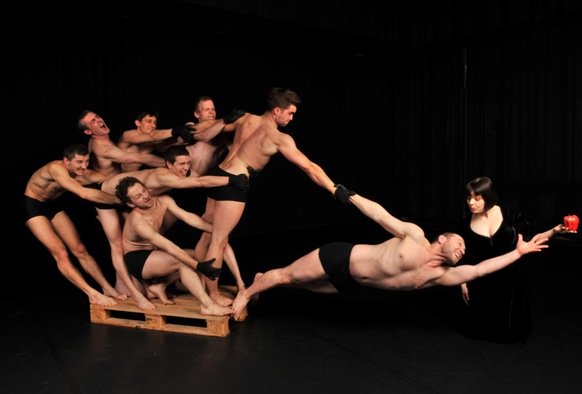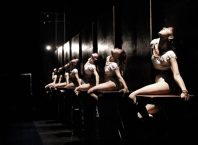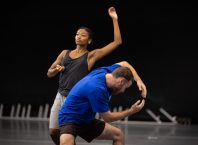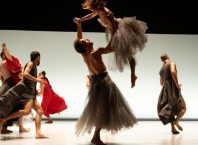Palle Granhøj’s Men and Mahler is full of opposing elements: the eight male dancers are the subject of the work, yet the stage is often given to a female singer and commentator, the music is dark, yet the feel of this dance-theatre piece is light and humorous. Granhøj’s company performed two works at the Suzanne Dellal Centre as part of Tel Aviv Dance 2014: Dance Me to the End On/Off Love, centered on the songs of Leonard Cohen and Men and Mahler, which was about men. Or not…

Eight men, a diverse ensemble of international dancers, each with a different look, physique, age and background, are observed at work and play, as they go about just being, well, men. Although Men and Mahler sits very comfortably in the dance-theatre niche, and includes considerable text, the men do not speak. They do emit sounds, grunts, groans and even cheers – but no words. The one woman onstage however, does speak, in fact, she almost can’t seem to stop talking. She is an enthusiastic observer/commentator on this world of men, and is eager to tell the audience all about these exotic creatures.
The differences between the dancers are used to advantage, as are the flat wooden boxes that are assembled, thrown and manipulated in many ways. There are some beautiful moments, both poignant and comic. In one scene, a large, muscular dancer is pinned down, with all the others holding on to his legs and lower body in an almost sculptural pose. Only his arms, head and upper torso are able to move, and he uses them eloquently. The other dancers are holding him down, but they are also holding him aloft; his hands and arms fly through the air like a sorcerer, finding wonders and gathering them in, cradling magic in his arms. In another scene, the female observer/commentator interprets the movements of two men, converting their gestures into sentences. Literal interpretation always has a high amusement potential and it works very well here, in the translation from dance to ‘conversation.’
Yet, when I consider the female observer, I cannot help but notice that she is barefoot, and wearing a lovely green print dress with a white collar, a bit retro, and yes, she has a laptop, but she is very pointedly eating an apple. Just as her assumptions and observations about men are a bit clichéd (and that is part of the fun), her persona is likewise not so much a woman character in this work, but an archetypal comic woman character.
Looking back on Men and Mahler, it seems not so much about men, but about the ways in which men and women sometimes perceive and think of one another. A light-hearted look at gender differences, complete with plenty of body part jokes and beautiful music.





